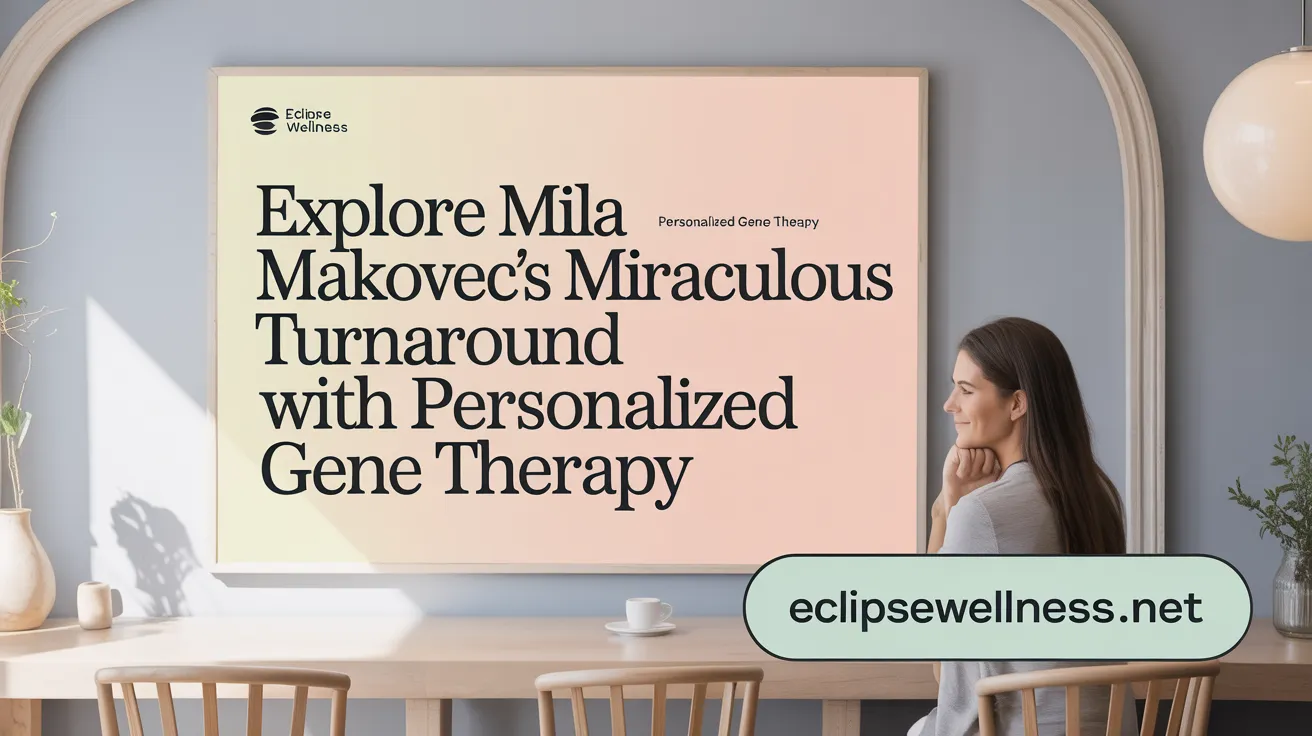The Promise and Power of Personalized Medicine
Personalized healthcare, tailored to the unique genetic, lifestyle, and medical profiles of individuals, is revolutionizing medicine. This approach moves beyond one-size-fits-all treatments, offering targeted therapies that improve patient outcomes, minimize side effects, and enhance quality of life. Through innovative collaborations among healthcare providers, governments, technology companies, and research institutions, personalized medicine has achieved remarkable successes. This article explores inspiring stories of patients who embraced individualized treatment, demonstrating the transformative impact of this cutting-edge healthcare approach.
Groundbreaking Success: Mila Makovec’s Journey with a Tailored Drug

What are some success stories of patients benefiting from personalized healthcare and tailored treatment approaches?
One of the most inspiring examples is Mila Makovec, a young girl diagnosed with Batten disease. Her case exemplifies how personalized medicine can transform lives. Mila’s treatment, called milasen, was custom-developed specifically for her genetic mutation.
Genetic profiling played a crucial role in designing milasen. After sequencing her genome, doctors identified the precise genetic error responsible for her condition. This information allowed researchers to create an antisense oligonucleotide aimed at fixing the mutation, which was administered through spinal injections.
The development of milasen was a collaborative effort involving multiple labs and biotech companies, illustrating how partnerships drive innovation in personalized medicine. The process was remarkably swift, showcasing how targeted therapies can be created in a shorter time frame and at potentially lower costs than traditional drug development.
Clinical results were promising. Within twenty months of treatment, Mila experienced a significant reduction in seizures and gained new abilities, such as eating independently. Her case was published in the New England Journal of Medicine, confirming the scientific credibility of her personalized therapy.
Mila’s success has sparked broader interest and efforts to develop similar treatments for other children with genetic neurodegenerative diseases. Over 100 families have reached out seeking comparable personalized solutions, prompting organized initiatives among academic medical centers.
This case illustrates how innovative collaborations and digital transformation in healthcare—such as biomarker testing and genetic analysis—are paving the way for more effective, individualized treatments. The example of Mila's personalized approach demonstrates a future where genetic information guides precise, fast, and affordable therapies, changing the standard for patient care.
Collaborative Efforts Driving Personalized Medicine Forward

How do collaborations across sectors foster personalized healthcare?
Innovative partnerships between healthcare providers, governments, technology companies, and researchers are vital for advancing personalized medicine. These collaborations pool resources, expertise, and data to develop targeted treatments more efficiently.
What role do healthcare providers, governments, and tech companies play?
Healthcare providers bring clinical insights and patient data, governments support regulatory frameworks and funding, and tech companies contribute with advanced technologies like genomic sequencing and data analytics. Together, they create an environment where personalized treatments can be developed and implemented faster.
How do these partnerships accelerate the development of personalized therapies?
By combining efforts, these collaborations streamline research, reduce costs, and shorten development timelines. A notable example is the rapid creation of Mila Makovec's treatment, which was tailored to her genetic profile through a collaborative effort involving multiple labs and organizations.
What is Genentech’s role in advancing personalized medicine?
Genentech emphasizes multidimensional collaborations to push the boundaries of personalized therapies. Their commitment to partnering across sectors enables innovative research and the translation of scientific breakthroughs into real patient benefits.
How do these collaborative successes affect patient care?
Breakthroughs achieved through partnerships have led to significant improvements in patient outcomes. Successful cases like Mila’s treatment demonstrate that collaborations can produce personalized medicines quickly, often at lower costs, and help individuals with previously untreatable diseases.
| Aspect | Description | Example |
|---|---|---|
| Sector Involvement | Healthcare, government, technology | Mila’s gene sequencing, antisense oligonucleotide therapy |
| Impact | Faster development, better outcomes | Reduced seizures, improved independence |
| Notable Projects | Personalized cancer therapies, rare disease management | HER2-targeted breast cancer treatments, phenylketonuria care |
These collective efforts showcase the transformative power of partnerships in making personalized medicine a reality, ultimately benefiting many patients worldwide.
Personalized Cancer Therapies: Precision That Saves Lives

What examples demonstrate the positive results and impacts of personalized healthcare?
Personalized cancer therapies exemplify the remarkable progress in healthcare tailored to individual genetic profiles. For instance, treatments targeting specific tumor mutations, such as HER2-positive breast cancer, have transformed patient outcomes. The drug trastuzumab is a prime example, significantly improving survival rates and offering more effective, less invasive options.
Advanced techniques like immunotherapy and precision radiotherapy further showcase this progress. These approaches are designed based on tumor genetics and patient-specific factors, enhancing treatment efficacy while minimizing side effects.
Real-world data highlight the success stories of patients who have experienced better health outcomes thanks to these precise interventions. For example, patients with tumors characterized by specific genetic markers often respond better to targeted treatments, leading to longer survival and improved quality of life.
The continuous development of therapies based on genetic insights is also extending to managing rare genetic disorders and chronic conditions, illustrating the broad potential of personalized medicine.
| Aspect | Example | Impact |
|---|---|---|
| Tumor genetics | HER2 mutations in breast cancer | Improved survival, fewer side effects |
| Immunotherapy | Checkpoint inhibitors tailored to tumor PD-L1 expression | Better response rates |
| Radiotherapy | Precision radiotherapy based on tumor location and genetics | Reduced damage to healthy tissue |
| Patient outcomes | Over 100 families seeking personalized treatments | Increased hope and new treatment options |
Overall, personalizing treatments according to genetic profiles not only enhances effectiveness but also reduces adverse effects, making cancer care more patient-centered and successful.
Managing Rare Genetic Disorders Through Personalization

How does genetic testing enable early diagnosis?
Genetic testing plays a crucial role in detecting rare genetic disorders early on. By analyzing a patient’s DNA, healthcare providers can identify specific mutations or anomalies that cause these conditions. Early diagnosis allows for timely interventions, which can significantly improve health outcomes.
What are some tailored dietary and therapeutic interventions?
Once a diagnosis is confirmed, personalized treatment plans are developed. For example, dietary modifications can be tailored to reduce symptoms or prevent disease progression. Therapeutic approaches, such as specialized drugs or therapies, are customized to fit the genetic profile of each individual.
Can you provide examples like phenylketonuria?
Phenylketonuria (PKU) is a genetic disorder that affects how the body processes the amino acid phenylalanine. With early detection through genetic testing, children can follow a low-phenylalanine diet that prevents intellectual disability and improves their quality of life. This illustrates how personalized care directly benefits the patient.
How does such care enhance quality of life?
Personalized healthcare allows for interventions that are precisely aligned with a person’s genetic makeup, lifestyle, and needs. For patients with rare genetic disorders, this means fewer symptoms, fewer side effects, and a more manageable condition. Such tailored approaches lead to better daily functioning and overall well-being.
What is the role of personalized care plans?
Customized care plans are fundamental in managing complex or rare conditions. They involve continuous monitoring, adjustments based on patient feedback, and a holistic approach that considers physical, emotional, and social factors. This ongoing, adaptive care helps patients maintain health and achieve better long-term outcomes.
| Aspect | Description | Examples |
|---|---|---|
| Early Diagnosis | Using genetic testing to identify disorders in early stages | Phenylketonuria, other rare genetic conditions |
| Tailored Treatments | Designing specific interventions based on genetic profiles | Specialized diets, targeted drugs |
| Quality of Life | Improving daily function and reducing disease burden | Fewer complications, better mental health |
| Care Management | Personalized plans with ongoing adjustments | Regular monitoring, lifestyle advice |
Personalized medicine is transforming how rare genetic disorders are managed, offering hope and better life quality for many patients.
Personalized Approaches in Chronic Pain and Addiction Treatment
How do genetics and lifestyle influence pain management?
Personalized pain care considers each patient’s genetic makeup, medical history, and lifestyle. For example, treatments are tailored to address specific needs, which can lead to more effective pain relief with fewer side effects. Clinics like Bodyworks Physical Therapy focus on customizing treatment plans, integrating physical, emotional, and psychological support to ensure comprehensive care.
How are medications and therapies customized for individuals?
Personalized medicine involves selecting medications and therapies based on individual profiles. This targeted approach improves treatment efficacy and reduces adverse effects. For chronic pain, this might mean choosing specific drugs aligned with a patient’s genetic markers or lifestyle factors. Similarly, therapies are adjusted over time through continuous feedback, ensuring sustained effectiveness.
In what ways are addiction treatments made more individualized?
Addiction recovery programs are increasingly tailored to each person’s social, mental health, and behavioral circumstances. Combining counseling, medication-assisted therapies, and social support systems helps address underlying issues more effectively. This personalized approach enhances the chances of long-term sobriety and improves the overall quality of life.
What are the results of these personalized treatments?
Personalized strategies in managing pain and addiction have shown promising results. Patients experience better pain control, reduced adverse effects, and a greater likelihood of sustained recovery. For example, in chronic pain management, targeted therapies lead to improved outcomes, while addiction treatments that consider individual circumstances increase success rates.
| Aspect | Impact | Additional Details |
|---|---|---|
| Pain management | Better control, fewer side effects | Tailored medication, lifestyle-based approaches |
| Addiction recovery | Increased success, longer sobriety | Counseling, medication, social support integration |
| Overall patient outcome | Enhanced quality of life | Continuous reassessment and personalized adjustments |
This personalized approach is transforming healthcare by making treatments more effective, especially for complex conditions like chronic pain and addiction.
Patient Experiences: Real-World Outcomes with Personalized Medicine
Patients who have embraced personalized medicine often report significant improvements in their health outcomes. Many describe treatments that are more effective and lead to faster recovery times, which can be life-changing, especially for those with rare or complex conditions. For example, children like Mila Makovec with genetic neurodegenerative diseases have experienced a reduction in seizure activity and increased independence through targeted therapies tailored to their genetic profiles.
In addition to better health results, patients frequently mention fewer side effects compared to traditional treatments. Personalizing therapy based on genetic testing and individual health factors helps minimize adverse reactions, making treatments both safer and more tolerable.
Beyond physical outcomes, personalized medicine boosts patient confidence and a sense of control over their health journey. Patients feel more empowered when they understand the genetic basis of their condition and receive clear, detailed explanations from healthcare providers. This transparency fosters trust and satisfaction, motivating patients to stay engaged and committed to their treatments.
However, embracing personalized medicine can also present challenges. Some patients harbor mistrust in new or experimental treatments, especially when rapid developments challenge traditional healthcare norms. It underscores the need for comprehensive education and open communication about the safety, efficacy, and scientific basis of these therapies.
Building strong provider-patient relationships is crucial. When healthcare professionals take the time to explain processes, address concerns, and involve patients in decision-making, it enhances trust and adherence to treatment plans. As personalized medicine continues to advance, ongoing education for both patients and providers remains vital to maximize benefits and tackle emerging obstacles.
The following table summarizes observed patient-reported benefits, the effectiveness and safety of personalized treatments, and critical aspects of patient-provider interactions:
| Benefits Reported | Impact on Health | Interaction Factors |
|---|---|---|
| Improved health outcomes | Fewer side effects | Clear communication |
| Faster recovery | Increased confidence | Respectful engagement |
| Increased empowerment | Better management | Ongoing support |
| Problem-solving through education | Long-term relationship building | Trust development |
As shown, personalized medicine not only enhances physical health but also positively influences patient experiences and relationships, fostering a more holistic approach to healthcare.
Case Studies Demonstrating Transformative Individualized Treatment Plans
How do case studies highlight the benefits and transformative effects of individualized treatment plans?
Case studies serve as compelling evidence of the advantages of personalized medicine by showcasing real-world examples of symptom reduction and patient recovery. These reports detail how tailoring treatments based on genetic profiles, lifestyle factors, and co-occurring conditions can dramatically improve health outcomes. For instance, Mila Makovec's case of Batten disease demonstrates how a specifically designed drug, milasen, based on her genetic mutation, led to significant decreases in seizures and enhanced daily functioning.
How are symptoms reduced and recovery encouraged?
Personalized approaches allow treatments to target the root causes of particular health issues. In Mila's case, the antisense oligonucleotide was adapted precisely to her genetic error, resulting in a faster development process and effective symptom management. Similar strategies in cancer, such as targeted therapies for HER2 mutations, focus on specific tumor genetic profiles, leading to improved survival rates and fewer side effects.
How do considerations of co-occurring conditions and patient preferences improve outcomes?
Healthcare providers increasingly factor in each patient’s unique circumstances, including other health conditions and personal preferences. This holistic view ensures treatments are more acceptable and sustainable for patients. For example, managing rare genetic disorders through early diagnosis and tailored care plans enhances quality of life, while chronic pain treatments are customized based on genetic and lifestyle factors, yielding better pain control.
What is the impact on patient engagement and satisfaction?
Personalized care fosters stronger patient engagement by involving individuals in their own treatment planning. Patients experience greater satisfaction when therapies resonate with their needs and preferences, leading to improved adherence and long-term success. Bodyworks Physical Therapy exemplifies this, customizing plans considering lifestyle, goals, and emotional well-being.
How is the benefit of personalization quantified through research?
Research examples highlight that personalized treatment strategies can lead to more efficient development, often at lower costs, and faster results. Mila’s story, documented in the New England Journal of Medicine, shows how personalized treatments can be developed swiftly compared to traditional methods, benefiting patients with previously untreatable diseases.
What are holistic and person-centered approaches?
Successful personalized healthcare integrates physical, emotional, and psychological support. Techniques like mindfulness and stress management are incorporated to address the whole person, not just symptoms. Ongoing feedback and reassessment ensure interventions stay relevant and effective, building long-term relationships that support sustained health improvements.
| Aspect | Approach | Impact | Example |
|---|---|---|---|
| Symptom management | Tailored interventions based on genetic/clinical data | Faster recovery and symptom control | Mila’s antisense oligonucleotide |
| Patient participation | Inclusive treatment planning | Increased engagement and adherence | Bodyworks’ personalized therapy plans |
| Holistic care | Addressing emotional and psychological well-being | Improved overall health | Mindfulness in physical therapy |
| Research findings | Evidence of faster, more cost-effective development | Lower costs, quicker solutions | Mila’s treatment development |
Scientific Evidence Supporting Personalized Healthcare’s Success
What evidence supports improved health outcomes through personalized healthcare strategies?
The foundation of personalized medicine's success is built on robust scientific evidence from multiple sources. Clinical trials and observational studies consistently demonstrate that therapies tailored to an individual's genetic profile or specific disease markers lead to better diagnostic accuracy and more effective treatments.
For example, in oncology, mutation-specific therapies like trastuzumab for HER2-positive breast cancer have shown significantly improved survival rates. These targeted treatments not only increase response rates but also reduce side effects by sparing patients from unnecessary therapies.
Genomic and biomarker-driven approaches have been particularly impactful. Genetic testing helps identify patients most likely to benefit from specific drugs and allows for early detection of diseases, which is crucial for prompt intervention.
Real-world data from healthcare settings confirm that implementing personalized strategies results in improved patient outcomes. Patients often experience longer progression-free periods and enhanced quality of life, especially when treatments are customized based on their unique genetic makeup.
Furthermore, advancements in early detection – through genetic screening and biomarker analysis – enable preventive strategies and early intervention, reducing disease severity and improving long-term health.
The effectiveness of these personalized approaches is evident in diverse fields such as cancer, genetic disorders, chronic pain management, and addiction treatment. Overall, the scientific evidence underscores that individualized healthcare strategies can lead to better survival outcomes, higher treatment success rates, and improved patient well-being.
| Aspect | Evidence & Example | Impact |
|---|---|---|
| Clinical Trials | Trastuzumab in breast cancer | Increased survival and targeted efficacy |
| Genomic Testing | Mutation identification in tumors | Personalized therapy selection |
| Predictive diagnostics | Biomarker-based early detection | Early intervention and prevention |
| Real-world Data | Oxygen therapy in chronic respiratory diseases | Improved quality of life |
| Outcomes | Longer progression-free survival | Better disease management |
This growing body of evidence affirms that harnessing genetic information and personalized interventions not only enhance clinical outcomes but also transform healthcare into more precise and effective for each individual.
Holistic Physical Therapy: Personalization Beyond Medicine

Personalized physical therapy approach by Bodyworks
Bodyworks Physical Therapy adopts a truly individualized approach to healing. Therapists carefully tailor each treatment plan to match the unique needs of their patients, considering factors like age, activity level, occupation, and personal goals. This approach ensures that therapies address not just symptoms but the root causes of physical issues, fostering more effective and sustainable recovery.
Addressing lifestyle, goals, and underlying causes
Beyond physical symptoms, Bodyworks evaluates patients' lifestyles, challenges, and personal aspirations. By understanding daily habits and personal objectives, therapists can design strategies that integrate seamlessly into patients' lives. This holistic view helps in managing not only injury or pain but also improving overall well-being.
Integration of mindfulness and stress management
Incorporating techniques such as mindfulness and stress management, Bodyworks emphasizes emotional and psychological health as part of physical recovery. These methods promote relaxation, reduce stress, and enhance treatment outcomes, recognizing that mental health is closely linked to physical health.
Continuous treatment reassessment
The clinic maintains a dynamic treatment process by regularly reassessing patient progress. Feedback from patients is used to refine therapies, ensuring continued relevance and effectiveness. This ongoing adjustment helps address evolving needs and optimizes recovery trajectories.
Long-term patient support and success stories
Bodyworks prioritizes building lasting relationships, offering ongoing support even after initial treatments. Successful cases include athletes returning to peak performance and individuals regaining independence. These stories highlight how personalized, holistic care can significantly improve quality of life and functional ability, demonstrating the profound impact of tailored therapy.
| Aspect | Description | Impact |
|---|---|---|
| Personalized plan | Treatments customized to patient needs | Better recovery, user engagement |
| Lifestyle integration | Strategies fit individual routines | Sustained results, lifestyle improvement |
| Mindfulness & stress relief | Holistic mental health techniques | Reduced anxiety, improved recovery |
| Ongoing feedback | Regular assessments for adaptation | Increased effectiveness |
| Long-term support | Continued care beyond initial treatment | Enhanced well-being, prevention |
This personalized and holistic approach exemplifies how physical therapy can extend beyond traditional methods, leading to improved health outcomes and long-term success.
The Future Is Personal: Embracing Tailored Healthcare Solutions
The success stories and evidence presented demonstrate that personalized healthcare is not just a promising concept but a transformative reality improving lives worldwide. Through tailored treatments, collaborative efforts, and patient-centric approaches, healthcare is becoming more effective, compassionate, and efficient. With ongoing advancements in digital technology, genetics, and data analytics, the horizon for personalized medicine is expanding rapidly. Patients empowered with individualized care plans experience better health outcomes and a higher quality of life, inspiring a future where medicine adapts to each person’s unique needs. This evolution underscores a vital truth: personalization holds the key to unlocking the full potential of modern healthcare.
References
- Powerful Partnerships Will Drive the Future of Personalized ...
- This girl's dramatic story shows hyper-personalized ...
- Why Personalized Treatment Plans Are Key to Success
- Treating the Whole Person
- Personalised Medicine—Implementation to the Healthcare ...
- Personalized Medicine: Motivation, Challenges and Progress
- The Role of Personalized Healthcare
- New Clinical Evidence Shows 85% Better Patient Outcomes
- What Is Personalized Health Care?
- The Role of Personalized Healthcare
